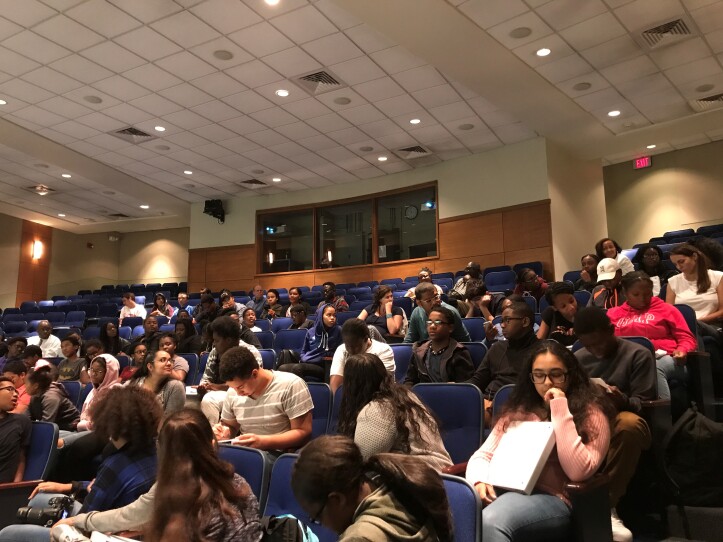The National Society of Black Engineers wants to produce 10,000 Black engineers per year by 2025. The number of engineering bachelor’s degrees awarded to African-Americans was 3,599 in 2014, according to the National Science Foundation.
Dr. Karl Reid, the executive director of NSBE, spoke at a panel this morning in the Cardinal Cushing Library Auditorium. The event was hosted by the Calculus Project, a program by Dr. Adrian Mims that works to equip African American, Latino and low-income students with knowledge and skills to succeed at higher-level math. Around 60 people, mostly middle school and high school students from around Boston with the Calculus Project, sat in the audience. Some of them held notebooks per request of Mims to take notes because he said in that moment the teenagers were building their “blueprint for success.”
Reid was joined by three other panelists, including Yevgeniya V. Zastavker, the inaugural director for the Research Institute for Experiential Learning Science at Northeastern University, Louis Celiberti, the senior director of the control and diagnostic system department of Pratt & Whitney, and Obi Obiora, an intern for Pratt & Whitney and a mechanical and engineering student at Worcester Polytechnic Institute.

The panelists gave the students advice on how to prepare for high school and college and on the importance of diversity in the professional world.
Reid told the teenagers about “deep-dive learning,” his alternative approach to learning that he writes about in his book, “Working Smarter, Not Just Harder: Three Sensible Strategies for Succeeding in College and in Life.” His three points were to have an attitude shift, a behavior shift and networking connections. Throughout the day, Reid reminded the students to “take agency” for themselves.
The theme that morning was self-efficacy and, of course, math.
Reid identified several challenges NSBE faces in achieving its goal of nearly tripling the number of Black engineers in the U.S. within the next six years. He says that many students don’t know about engineering and there is also a lack of resources, confidence and proficiency levels in math.
The old way is not cutting it, and we have to transform that.
NSBE plans to tackle these issues as early as the fourth grade and beyond through its summer engineering programs and junior chapters nationwide.
At the same time, Reid added that teachers and schools need to accommodate for black students and students of color, too. Classroom sizes need to be smaller and more intimate.
“Most people are realizing that the old way is not cutting it, and we have to transform that. But it’s very difficult to do when you have 30 or 33 children in a classroom with one teacher,” Reid said. “It has to be broken into small groups and restructured so that the students are working together to co-create their own knowledge.”




